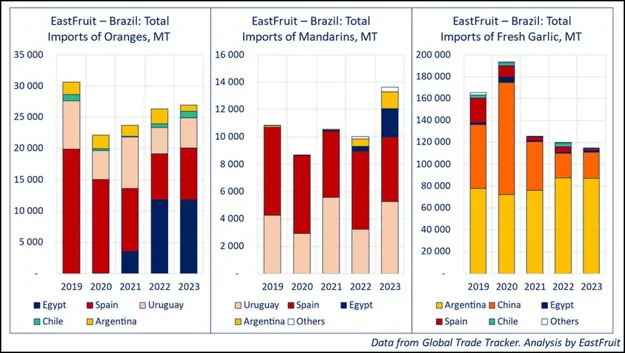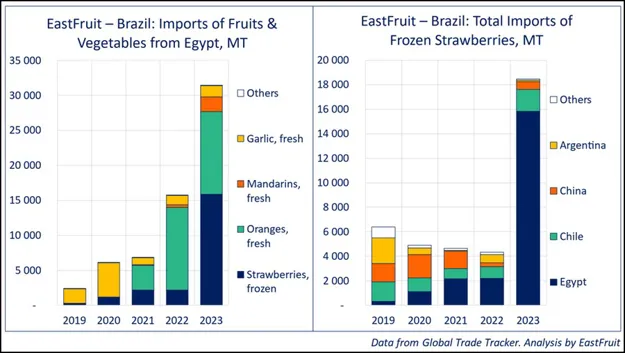According to EastFruit, Egypt is expanding its export markets for vegetables and fruits, and Brazil is one of the most promising destinations. In 2023, Egyptian exporters doubled their shipments of fresh and frozen fruits and vegetables to Brazil and gained a strong foothold for some products.
Over the last five years, Egyptian exports of fresh and frozen fruits and vegetables to Brazil have soared by more than 13 times! In 2019, garlic was the main product exported from Egypt to Brazil, with a total volume of less than 2.4 thousand tons. By 2023, Brazil had imported over 31 thousand tons of vegetables and fruits from Egypt, including frozen strawberries and citrus fruits (oranges and mandarins).
The main driver of the growth in total exports of fruit and vegetable products from Egypt to Brazil in 2023 was the surge in frozen strawberry exports. They increased by more than seven times compared to 2022, reaching 16 thousand tons, and gave Egypt a record 86% share of the Brazilian import market. Egyptian suppliers also outperformed their rivals from China, as well as from nearby countries like Chile and Argentina.

Egypt remained the top supplier of imported oranges to Brazil for the second consecutive year, delivering nearly 12 thousand tons of these fruits. Its main competitors in 2013 only exported 8.3 thousand tons (Spain), 4.8 thousand tons (Uruguay), 1.1 thousand tons (Chile) and 1 thousand tons (Argentina) to Brazil. Brazil, despite being the world leader in producing and exporting orange juice, still imports between 20 and 30 thousand tons of oranges every year for fresh consumption.
Besides oranges, Egypt also exports mandarins to Brazil, which saw a significant increase in 2023, rising by five and a half times to 2.1 thousand tons. However, Egypt still lags behind in the ranking of mandarin suppliers, as Uruguay and Spain shipped 5.3 thousand tons and 4.7 thousand tons of these fruits to Brazil last year, respectively.
Garlic was the fourth major category of Egyptian exports to Brazil in 2023, but Egyptian exporters had less success in this market than in the mandarin segment. The exports of Egyptian garlic only grew by a quarter to 1.6 thousand tons, and Egypt had a meager 1.4% share of the Brazilian import market. Argentina (87 thousand tons) and China (24 thousand tons) dominated the market.
For more information: east-fruit.com




